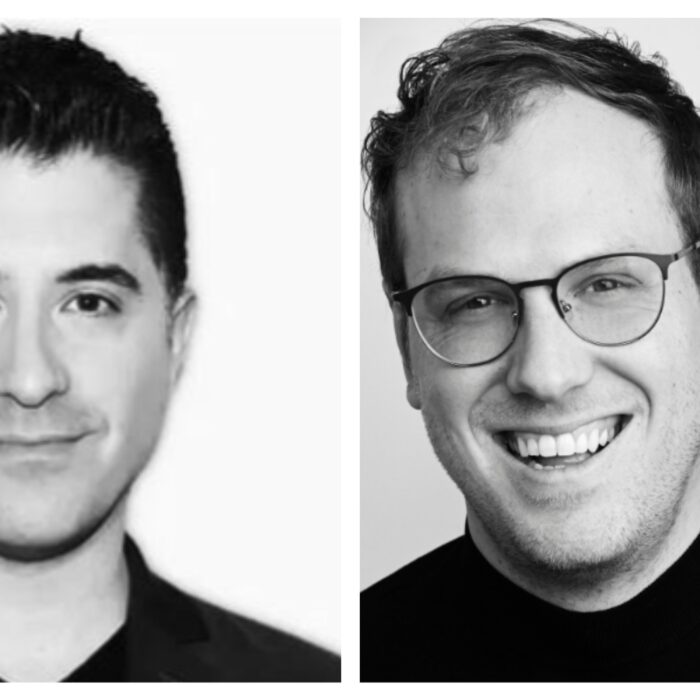
Q & A: Lawrence Brownlee & Michael Spyres on Rossini, New ‘Amici e Rivali’ Album, Theatre Closures, and the Road Ahead
By Logan MartellOn Nov. 13, 2020, renowned tenors Lawrence Brownlee and Michael Spyres are set to release their new album “Amici e Rivali” on Erato.
The selections draw from seven of Rossini’s operas, with an approach that not only celebrates his music but pays homage to the artists of the composer’s time who interpreted these works, such as Andrea Nozzi, Giovanni David, Manuel Garcia, Louis Nourrit, among others.
Corrado Rovaris conducts I Virtuosi Italiani, with Brownlee and Spyres also being joined by guest appearances from mezzo-soprano Tara Erraught and tenor Xabier Anduaga for this program of arias, duets, and trios.
OperaWire had the opportunity to speak with Brownlee and Spyres about the album’s inspiration and recording process, as well as their thoughts on recent events in the opera world as it goes forward with the ongoing Covid-19 pandemic.
OperaWire: Tell us about your experience recording the album at the Teatro Ristori in Verona, what was it like working with Corrado Rovaris and I Virtuosi Italiani?
Michael Spyres: Recording this album in Verona was one of the best experiences I’ve ever had in my professional life. It was extremely intense having only 5 days to record an album like this but some of the greatest art comes from being under pressure like we were. Everyone was such a pleasure to work with and we all had the same goal in common which was to achieve the highest art possible.
Lawrence Brownlee: What an amazing experience it was to record this album in Verona. Michael and I felt that it was important to record this project in Italy with an Italian conductor and a group of Italian musicians who truly understood the style. The beautiful, newly restored Teatro Ristori was a perfect little jewel of a venue to capture this project. Corrado Rovaris is a long time friend of mine who gave me my first opportunity more than 20 years ago when he invited me to sing at Teatro Alla Scala of Milan. Corrado brought his immense knowledge of Bel Canto and Rossini and was in total command of the enthusiastic, inspired members of I Virtuosi Italiani. We were fortunate to have the perfect group for this special project.
OW: How do you feel this album compares to previous ones you’ve recorded, in regards to musical selections, and your approach to the works?
MS: I’m extremely proud of this album and it is the first of its kind in recorded history because it specifically profiles every tenor duet that Rossini wrote. We wanted to showcase the great maestro and pay homage to his exceptional music. I believe the most exciting aspect of the album is to see the progression of Rossini as well as to see in his lesser-known works how much he truly influenced everyone that came after him. Even Rossini lovers will hopefully hear something new with our takes on this album and our goal is to bring a little more joy into the world. Within Rossini’s music, there is an infectious optimism and in these difficult times, we believe it is a necessity for people around the world to be inspired.
LB: Rossini was a master of writing for tenors and did a great job of highlighting the two different types of Rossini tenors. This album is different because we zeroed in on something special and specific. Our approach was to bring freshness and individuality to this rare material by adding exciting cadenzas and phrasing that go beyond just singing the many notes. It also created what we believe Rossini intended to. We believe that this will show the true genius of the great Rossini.
OW: How would you describe your respective relationships with the music of Rossini?
LB: Rossini has been a large part of my career up to this point and I feel like I understand the style. To this date, I have sung more than 17 different roles of Rossini. The more I sing his music, the more I learn. I hope to add more roles of Rossini under my belt and to continue to be a student of his music.
MS: My entire career has revolved around this magnificent composer and he is truly one of the most influential people in my professional life. I can honestly say that I would not have the life and career that I currently have without the help of Rossini’s music. Singing his music has taken me around the world and I could not be more grateful for this. Over the years I have had the privilege to study the beautiful art that help bring the world and it has helped me on a deeper level to become a better human and share his eternal optimism with others.
OW: Michael, you’ve referred to the structure of the album as following the musico-dramatic arc of a Rossini opera, how would you describe the overall story created by the selections? What are some of the themes and messages?
MS: As the overarching theme of Rossini’s music I would have to say that it is Hope and desire to Revel in beauty, in emotion, and celebrate the human condition. I crafted the order and selected the order of the album to mimic the structure of a Rossini opera. I wanted the listeners to take a guided journey of the structure of opera by beginning with the overture ( Figaro) followed by the presentation of characters (Riccardo e Zoraide) who then begin the rivalry for the love interest (La donna del lago). After setting up the story you then have the drama where the rival tenors question fidelity and friendship (Elisabetta, Regina d’Inghilterra) followed by the deception which further drives the drama to dueling (Otello). After the action comes a reflection of the conflict and questioning of morals (Le siège de Corinthe) which ultimately leads to the Protagonist, i. e. the listener, overcoming all obstacles to triumph by fighting for the ultimate emotion of the human experience, love (Armida). This trio is one of a kind in all of opera and perfectly sums up the overarching theme of all storytelling, the hero’s journey. I wanted the listener to go back and forth with emotion and feel as though they are the Protagonist and the trio of Armida perfectly sums up the albums intentions by making everyone question their conceptions of Rossini. I want people to understand that Rossini was a radical composer like no other. We want to open the broader public’s eyes to how he influenced everyone that came after him. Hopefully this album will help people realize how Rossini grew as composer throughout his career and ultimately show people worldwide that he was far more than just a genius of comedy.
OW: Lawrence, over the last few months you’ve been having discussions with prominent Black artists through “The Sitdown with LB,” what are some of the things you’ve learned or found resonated with you most so far?
LB: I have thoroughly enjoyed the last few months of getting to know my colleagues even better than before. We have discussed many topics and I have had the pleasure of engaging in these incredible conversations about their lives and careers. There are many similarities to my own career, but it has been refreshing to hear about the triumphs and struggles while appreciating what all of the incredible artists have accomplished. The episodes are full of many wonderful anecdotes and stories of how they found the courage to face hardship and struggle that made them better for it today. Also, I have had the pleasure of experiencing many laughs, which I love!
OW: In a time when musical collaboration is harder than ever, what were some of the challenges during the course of recording, and what are some of the rewards?
LB: To be honest, we had such a wonderful team that we didn’t face too many challenges while recording. Michael and I have recorded several albums thus far and had a well thought out schedule to ensure minimal vocal and mental fatigue, which can make recording difficult. We also had an exceptional producer and sound engineer that made sure that we could maximize our time and energy by pacing ourselves intelligently. The rewards were many. It was a team effort and it was inspiring to see Michael, Corrado, and the orchestra concentrating and dialing in to deliver their very best. When we wrapped up the recording, we were all very pleased with what we were able to capture.
MS: We had the great fortune of recording our album last summer in Verona so we were able to deal with the difficulties of recording pre-Covid. It takes quite a long time to properly market and put out an album so we were very lucky to have the finished product before the world changed. I will say though that Larry and I were fortunate as well to have recorded a very special live concert just last month in Firenze which will premiere on our worldwide release date, November 13th. We sang a live concert under strict Covid compliant measures in the amazing Giardino Corsini in association with the Mascarade Opera Studio. The audience and crew were all in masks for the duration of the concert and Larry and I were properly spaced out. I have to say that I was a bit emotional since it was the first concert that I gave in over 7 months for a live audience. The great thing is that while performing in the pandemic there is an energy and a palpable realization that our profession is very much needed to keep the connection between us as humans. Art matters and live performance of art matters immensely.
OW: What are your thoughts on the recent closures of opera houses throughout Europe?
MS: I am very much against the full closure of Opera Houses and theaters and I have witnessed first-hand appalling behavior from major opera houses towards their artists. We as artists are innovators and should be allowed to use our creativity to help everyone during this time. There has been no evidence of clusters of outbreaks among opera houses and theaters as far as I am aware of, yet we in the arts are repeatedly lumped into the category of non-essential business. People’s professions and livelihoods are at risk because of the inability of our collective governments to have any nuanced debate or understanding surrounding this topic. Recently in Germany, it was announced that we as artists are looked upon collectively by governments as no different than brothels and betting parlors. No offense to either of these types of businesses, but it is quite out of line and telling of their contempt that a government would choose to debase our profession in this way.
LB: I am obviously saddened by the closures in Europe. So much of my career is over there and it feels strange to not be there. That being said, we hope the album will keep people interested until we are fortunate enough to be able to share this and other music in the beautiful cities of Europe.
OW: Is there anything you’d like to say to audiences at home, or to young artists who are trying to navigate this difficult landscape?
LB: I would encourage audiences and young artists to enjoy beautiful art as much as they can from afar. Hold on to the belief that we will once again be able to experience the music we love in the spaces they were meant to perform in. Keep the faith.
MS: Don’t give up hope. Opera was born out of necessity and has survived for over 400 years. The Arts have seen much worse times and through it all, it has survived famine, plague, and even world wars. In these difficult periods of humanity, it is our responsibility as artists to help the world through art’s healing abilities. This may seem like a futile effort at times but helping humanity is the ultimate goal of the arts. We are the keepers of the flame and it is our duty to change the course of humanity through the proliferation of the arts. Heed the words of Arthur O’Shaughnessy when he said “We are the music makers,/And we are the dreamers of dreams/…Yet we are the movers and shakers/Of the world forever, it seems.” The world needs us now more than ever and this is our time to inspire and incite positive change the world over.



